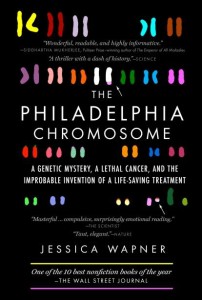At a recent press conference for Ken Burns’ forthcoming Cancer: The Emperor of All Maladies feature series, airing on PBS March 30–April 1, the mood was rather upbeat for a discussion on America’s second leading cause of death. Doctors raved about the promising breakthroughs in immunotherapy, and how they can now treat 80% of childhood cancers. The story of cancer is still being written, but doctors and scientists are increasingly optimistic that we’re getting near the end.
The turning point, when researchers identified where cancer comes from and began to create drugs that target the disease at its root, was briefly summarized in a 10-minute preview clip that Burns chose to show the media. Burns followed the clip by saying that this documentary includes “interviews with the finest set of talking heads in any film.”

Those very same talking heads—and the transformational moment in modern medicine that they tell—fill the pages of Jessica Wapner’s The Philadelphia Chromosome, published in the Spring of 2013. In the film, the Nobel-winning duo of J Michael Bishop and Harold Varmus briefly recap their groundbreaking discovery that cancer-causing genes reside in our own genomes; the science behind their finding is told in full in Wapner’s book. Richard Klausner, director of the National Cancer Institute, David Baltimore, winner of the Nobel Prize for his work on retroviruses, Robert Weinberg, the first to discover a human cancer-causing gene—they all appear in the film, and you’ll find more on all of them in The Philadelphia Chromosome, which has a foreword by Weinberg and draws on interviews with the others.
The Philadelphia Chromosome has all this and more. No single documentary could ever possibly tell the whole story of such a complicated disease, and for those interested in learning more about the groundbreaking science Burns’ film touches on—not to mention a gripping narrative of the race to cure a deadly leukemia, a heroic doctor who would stop at nothing to save his patients, and the inspirational stories of the patients themselves—would do well to read what Siddhartha Mukherjee, author of The Emperor of All Maladies, called a “wonderful, readable, and highly informative” book.
By Jessica Wapner



